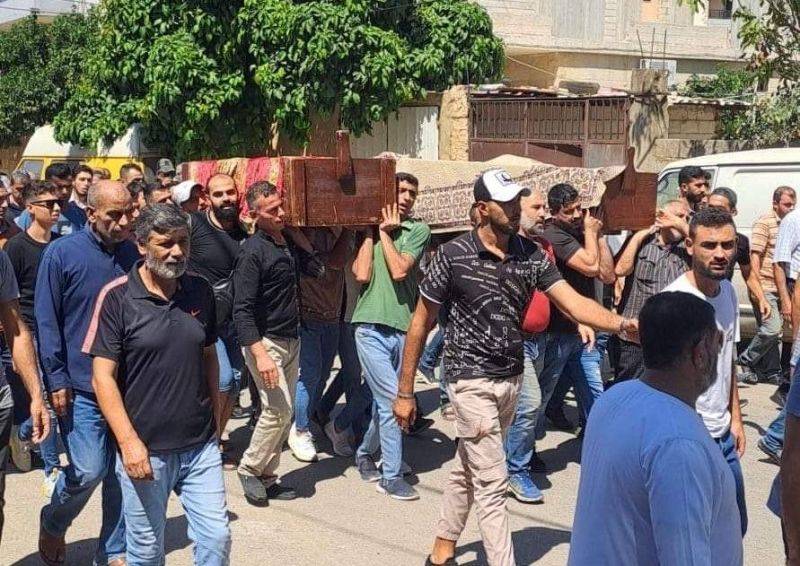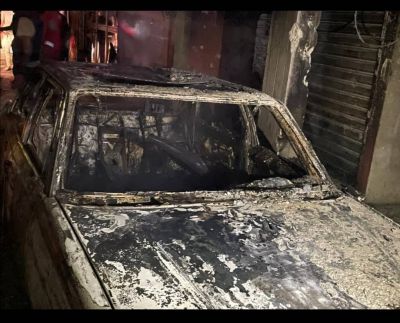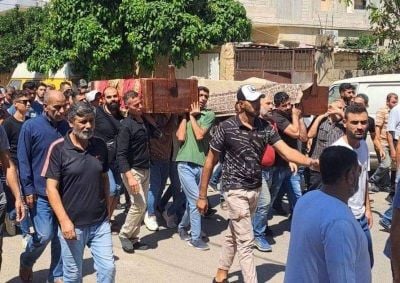
People carrying the coffin of one of the victims from the Tripoli shooting. Sept. 10, 2022 in the Bebnine village of Akkar. (Photo sent by our correspondent Michel Hallak)
As the country seems to be heading toward a total vacuum at the executive level, for the first time in its recent history, the security threat is re-emerging.
This weekend, two areas in Lebanon — Tripoli and Saida’s Ain al-Hilweh refugee camp — were shaken by security unrest. Such violence often serves as a means to convey political messages in a country as polarized as Lebanon which is sinking into an unprecedented economic and social crisis.
First, on Friday evening, unidentified assailants opened fire and threw a grenade at a cell phone store in the al-Tal neighborhood of Tripoli, the poorest city in the country. Four people were killed.
The next day, in the Palestinian camp of Ain al-Hilweh, near Saida, rival clans clashed with one another using assault weapons, leaving seven people injured.
Are these isolated incidents? While there is no evidence to the contrary, question marks hover over any connection between the two.
Financing armed groups?
In Tripoli, it all began when an ex-convict, identified by the army as K.A., a man “with a criminal and terrorist background,” arrived at the cell phone store by motorcycle with three other individuals. The men opened fire using assault weapons.
Armed clashes between the two sides ensued, reportedly leaving four people dead: the convicted felon, the store owner and two brothers who were employees in the store.
Large quantities of money reportedly found in the shop suggest that the owner may be “a member of the cells financing armed groups in the city,” a Tripoli security source told L’Orient-Le Jour on condition of anonymity, due to the sensitivity of the topic.
The owner of the store, M.K., is from the Alawite neighborhood of Jabal Mohsen in the northern capital. There is a bitter rivalry between Jabal Mohsen and the nearby predominantly Sunni Bab al-Tabbaneh neighborhood.
“Groups are trying to take advantage of the difficult situation in Lebanon to destroy what remains of the country’s stability,” one former security official told L’Orient-Le Jour.
Following the shooting, gunfire rang out on Friday evening in various parts of Tripoli and a grenade was thrown in the Rifa neighborhood.
These incidents were followed by several clashes that resulted in injuries in the Qibbeh neighborhood and in Nejmeh Square. The army and the Internal Security Forces were deployed to restore calm.
This incident raised fears of a new round of clashes between the rival neighborhoods of Jabal Mohsen and Bab al-Tabbaneh. The narrative in political circles, however, is more nuanced.
“The owner of the store was an Alawite, but his two employees were Sunnis,” said Ali Darwish, a former Alawite MP from Tripoli close to caretaker Prime Minister Najib Mikati.
“For the moment, the security forces are on the crime scene and should continue their investigation and reveal the truth,” he added.
In a statement issued over the weekend, the army announced it had arrested two suspects and seized two Kalashnikovs, three grenades and a large quantity of ammunition that were in one suspect’s possession.
The army handed over the suspect and the seized items to the judiciary, and an investigation was opened, the statement added.
A meeting of the Central Security Council, a body chaired by the interior minister, has been scheduled for Tuesday to discuss next steps, a source at the ministry told L’Orient-Le Jour, requesting anonymity due to the sensitivity of the situation.
Tripoli MP and former head of the Internal Security Forces Ashraf Rifi also stressed that MPs in the city were working to maintain calm.
“As MPs of Tripoli, we often meet to discuss issues of living conditions and security. We met on Saturday to discuss this incident, and all political sides called for calm,” he told L’Orient-Le Jour.
Absence of the state
But for many observers, calls for calm are not enough: The state must move quickly to avoid a deterioration of the situation.
“Today in Tripoli, the absence of a state is flagrant, to the point that a simple disagreement with a driver can cost you your life,” Khaldoun Sharif, a political scientist from the northern city, told L’Orient-Le Jour.
“Since the sinking of the migrant boat in April, which left dozens of people missing, and then the collapse of a building in June that cost the life of a little girl, the northern capital goes from one tragedy to another, amid total indifference from the state,” Sharif lamented, pointing out that extremist groups such as the Islamic State “feed on this weakness.”
Sharif added: “I do not think there is a direct link between the incident in Tripoli and that of Saida, although in both cases it is the product of the crisis and the absence of the state.”
In the Palestinian camp of Ain al-Hilweh, just outside Saida, clashes broke out on Saturday evening between members of the Bahti family, who are supporters of the Islamist group Ansar Allah, and others from the Qiblawi family, who are close to the Fatah movement, reportedly following a dispute over the opening of a store in the camp’s commercial market.
At least seven people were injured. The camp’s mosques and others called for a ceasefire.
According to L’Orient-Le Jour’s correspondent in the south, Mountasser Abdallah, the clashes caused significant material damage, with several cars and buildings in the camp heavily damaged.
Some buildings were also burned, including homes and some businesses.
The fighting, which lasted at least three hours, came to a halt on Saturday evening, reportedly after intervention by the Palestinian ambassador to Lebanon Ashraf Dabbour, who managed to negotiate a ceasefire between the two families.
“The state of insecurity in the Palestinian camp is certainly worrying, but we are coordinating with the Palestinian factions to calm the situation as much as possible,” Abdul Rahman Bizri, an independent MP for Saida, told L’Orient-Le Jour.
“The economic situation can be exploited by some parties to sow discord in the country,” he said, adding that the solution to such tensions lies in state-building.
This article was originally published in French in L’Orient-Le Jour. Translation by Sahar Ghoussoub.

